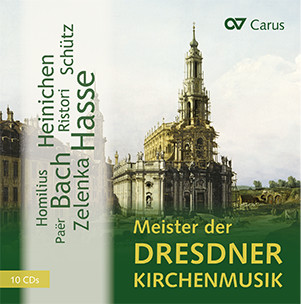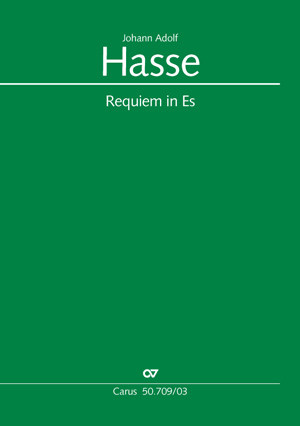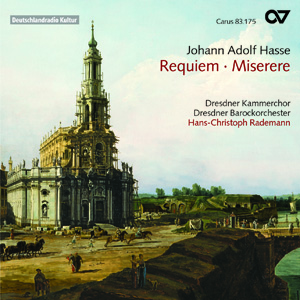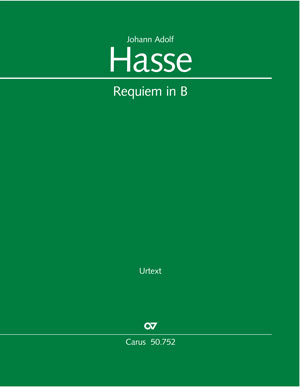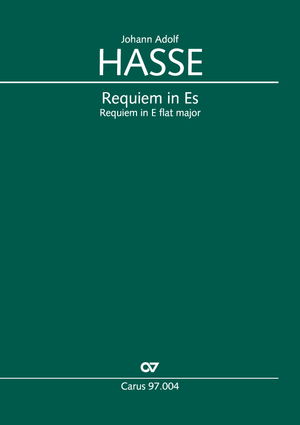
Johann Adolf Hasse Requiem in E flat major
1763/64
- Scoring:
- Soli SSAATTB, Coro SATB, 2 Cor, 2 Fl, 2 Ob, Str, Bc
- Search for works with similar scoring
- Language:
- Latin
- Duration:
- 42 min
- Difficulty level:
- 1 2 3 4 5
- Key:
- E flat major
 Listen
(18)
Listen
(18)
- Requiem aeternam
- Te decet hymnus + Exaudi
- Kyrie eleison I
- Christe eleison
- Kyrie eleison II
- Dies irae
- Recordare
- Ingemisco
- Qui Mariam absolvisti
- Inter oves
- Oro supplex
- Lacrimosa
- Dona eis requiem
- Sanctus - Osanna I
- Benedictus
- Osanna II
- Agnus Dei
- Requiem aeternam (da capo)
 Additional material
Additional material
- Purchase additional material as a download product.
-
 text (without music) for download, html file, Singing text, originalhtml file, Singing text, original (Sample)
text (without music) for download, html file, Singing text, originalhtml file, Singing text, original (Sample)...
-
 text (without music) for download, html file, Singing text, english translationhtml file, Singing text, english translation (Sample)
text (without music) for download, html file, Singing text, english translationhtml file, Singing text, english translation (Sample)Introitus et Kyrie 1. Requiem aeternam (Solo S, Coro) Lord, grant them eternal rest,
and let the perpetual light shine upon them.2. Versus: Te decet hymnus / Exaudi Thou shalt have praise in Zion, oh God,
and homage shall be paid to thee in Jerusalem.
Aria (Solo T) Hear my prayer. All flesh shall come before thee.3. Kyrie eleison I (Coro) Lord, have mercy upon us.
4. Christe eleison (Soli SA) Christ, have mercy upon us.
5. Kyrie eleison II (Coro) Lord, have mercy upon us.
Sequentia 6. Dies irae (Soli SSATTB, Coro) This day, this day of wrath
shall consume the world in ashes,
...
-
 text (without music) for download, html file, Singing text, German translationhtml file, Singing text, German translation (Sample)
text (without music) for download, html file, Singing text, German translationhtml file, Singing text, German translation (Sample)Introitus et Kyrie 1. Requiem aeternam (Solo S, Coro) Herr, gib ihnen die ewige Ruhe,
und das ewige Licht leuchte ihnen.2. Versus: Te decet hymnus / Exaudi O Gott, Dir gebührt ein Loblied in Sion,
Dir erfülle man sein Gelübde in Jerusalem.
Aria (Solo T) Erhöre mein Gebet,
zu Dir kommt alles Fleisch.3. Kyrie eleison I (Coro) Herr, erbarme Dich unser.
4. Christe eleison (Soli SA) Christus, erbarme Dich unser.
5. Kyrie eleison II (Coro) Herr, erbarme Dich unser.
Sequentia 6. Dies irae (Soli SSATTB, Coro) Tag der Rache, Tag der Sünden
...
-
 text (without music) for download, html file, Introductory text, Frenchhtml file, Introductory text, French (Sample)Texte du CD Carus 83.175
text (without music) for download, html file, Introductory text, Frenchhtml file, Introductory text, French (Sample)Texte du CD Carus 83.175Ortrun Landmann
Traduction (abrégé) : Sylvie CoquillatJohann Adolf Hasse naquit en 1699 à Bergedorf près de Hambourg. Il commença sa carrière en qualité de ténor à l’Opéra de Hambourg et présenta à l’Opéra de la cour de Braunschweig en 1721 une première œuvre scénique de sa composition. Il se rendit ensuite en Italie afin de parfaire sa formation, alla à Naples vers 1724 et y étudia entre autres la composition auprès d’Alessandro Scarlatti. De 1726 à 1730, il se fit remarquer à Naples par des opéras au style novateur, et à Venise lui manifesta aussi son intérêt à partir de 1730. Ici, où il contracta une longue et heureuse union avec la primadonna Faustina Bordoni, il acquit en même temps chez les « Incurabili » des premières expériences dans la composition et la prestation de musique spirituelle sur le modèle d’Antonio Vivaldi.
Les années 1733/34 furent le départ de trois décennies
...
-
 text (without music) for download, html file, Introductory text, Englishhtml file, Introductory text, English (Sample)Text from the CD Carus 83.175
text (without music) for download, html file, Introductory text, Englishhtml file, Introductory text, English (Sample)Text from the CD Carus 83.175Ortrun Landmann
Translation (abridged): John CoombsJohann Adolf Hasse was born in 1699 at Bergedorf, near Hamburg. He began his career as a tenor singer at the Hamburg Opera, and in 1721 at the Brunswick Court Opera he presented the first opera which he composed. Then he went to Italy to complete his studies. Around 1724 he arrived in Naples, where he studied composition under Alessandro Scarlatti. From 1726–1730 he attracted attention with stylistically progressive operas in Naples, and from 1730 also in Venice. In this city, where he wed the prima donna Faustina Bordoni in what was to be a lifelong, happy marriage, he also gained his first experience at the “Incurabili” composing and conducting sacred music, after the example of Antonio Vivaldi.
In 1733/34 there began the three decades of the “Hasse era” which made Dresden the focal point
...
-
 text (without music) for download, html file, Introductory text, Germanhtml file, Introductory text, German (Sample)Gekürzter Booklet-Text der CD Carus 83.175
text (without music) for download, html file, Introductory text, Germanhtml file, Introductory text, German (Sample)Gekürzter Booklet-Text der CD Carus 83.175Ortrun Landmann
Johann Adolf Hasse entstammte dem Hamburger Umland. 1699 wurde er in Bergedorf in einer Kirchenmusikerfamilie geboren und entsprechend erzogen. Mit 18 Jahren begann er jedoch, gefördert von dem berühmten Johann Mattheson, seine Berufslaufbahn als Tenor an der Hamburger Oper und kam ein Jahr später nach Braunschweig an die Hofoper, die 1721 Hasses Opernerstling auf die Bühne brachte (wobei der Komponist als Sänger mitwirkte). Anschließend begab sich der junge Musiker zur Vollendung seiner Ausbildung nach Italien. Etwa 1724 traf er in Neapel ein und studierte dort u.a. Komposition bei Alessandro Scarlatti.
Alsbald fielen die Würfel für sein künftiges Leben: Der lutherische Organistensohn entschied sich für Italien und konvertierte zum Katholizismus. 1726–1730 war er mit stilistisch vorwärtsweisenden Bühnenwerken in Neapel sehr erfolgreich, ab 1730 auch in Venedig. Hier, wo er die lebenslang glückliche Ehe mit der Primadonna Faustina Bordoni
...
Contents
-
Composer
Johann Adolf Hasse
| 1699-1783
-
Editor
Wolfram Hader
Reviews
(gd) Eine wichtige Erstausgabe des in der Mitte des 18. Jahrhunderts höchst berühmten Dresdner Hofkapellmeisters. Eine sehr schöne, 50 Minuten lange Komposition! [...]
Kirchenmusik im Bistum Limburg 1/2009
Reviews on our website can only be submitted by customers with a registered user account. A check whether the rated products were actually purchased does not take place.
Frequent questions about this work
 There are no questions and answers available so far or you were unable to find an answer to your specific question about this work? Then click here and send your specific questions to our Customer Services!
There are no questions and answers available so far or you were unable to find an answer to your specific question about this work? Then click here and send your specific questions to our Customer Services!


